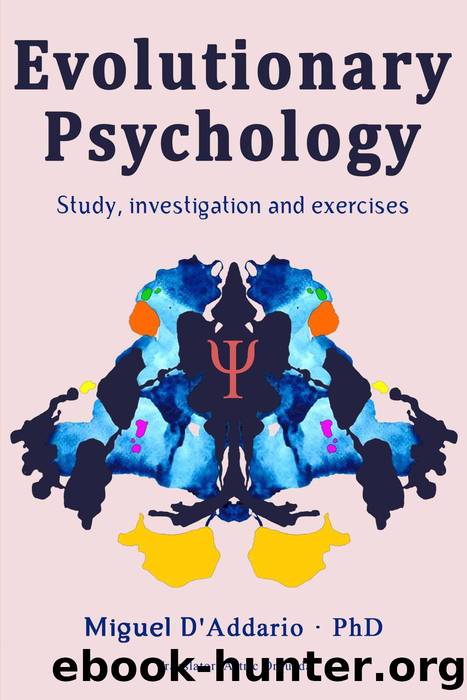Evolutionary Psychology by D'Addario Miguel

Author:D'Addario, Miguel [D'Addario, Miguel]
Language: eng
Format: epub
Publisher: Babelcube Inc.
Published: 2018-06-23T16:00:00+00:00
Three complementary levels of explanation in evolutionary psychology. Inferences (represented by arrows) can be made from a level to another one.
An evolutionary approach provides powerful lenses that correct âinstinct blindnessâ. It allows to recognize that natural capacities exit, it indicates that mind is a heretogeneous colection of those capacities and the most important, it provides positive theories of its designs. Einstein once commented that âtheory is what determines what we can observeâ. Evolutionary approach is valuable for psychologists, that study a biological system of fantastic complexity, because it can make that complicated profile of design of mind to become more defined. The theories of adaptative problems can direct the search for the cognitive programs that solve them; realising that cognitive programs exist, it is possible, thus, to direct the search for their neural bases.
The standar model of social science
Applying the evolutionary biology to the study of mind has led to most psychologist to conflict with the traditional model of their discipline, which arose long before Darwin. This model is not a historical relic: it retains a great influence, more than a century after the writings of Darwin and William James, it has been a common opinion between philosophers and scientists that human mind is similar to a White board, virtually free of content until it is written by the hand of experience. According to Thomas de Aquino, there is ânothing in the intellect that is not previously in the sensesâ. In this context, british Empiricists and their successors produced elaborated theories of how experience, refracted through a handful of innate mental procedures, wrote content in the mental board. David Humeâs doctrine was tipical and established the guideline for many subsequent social and psychological theories: â...it seems there is only three principles of connection among ideas to know, Similarity, Contiguity in time or place, and Cause or Effect ". Over the years, the technological metaphor used to describe the structure of human mind has been updated, going from White board to a switchboard and then to a general-purpose computer, but the central principle of those empiricist theories has not changed. Certainly, it has become the prevailing orthodoxy in the mainstream in anthropology, sociology, and most areas of psychology. According this orthodoxy, all the especified content of human mind procedes originally from the âExteriorâ, from the environment and the social world, and evolved architecture of mind consist only or predominantly of a small number of mechanisms of general purpose that are independents of contents and that are known as âknowledgeâ, âinductionâ, âintelligenceâ, âimitationâ, âracionalityâ. âthe capability for cultureâ or just âcultureâ. According to this point of view, the same mechanisms are used to controlled how one acquire a language, how to learn to recognize emotional expressions, how do you think about incest, or how to acquire ideas and attitudes towards friends and reciprocity, all except perception. It works on this way because it supposes that mechanisms that control reasoning, learning and memory work uniformly, according to unalterable principles, regardless of the content on which they are operating or on the broader category or domain involved.
Download
This site does not store any files on its server. We only index and link to content provided by other sites. Please contact the content providers to delete copyright contents if any and email us, we'll remove relevant links or contents immediately.
| Administration & Medicine Economics | Allied Health Professions |
| Basic Sciences | Dentistry |
| History | Medical Informatics |
| Medicine | Nursing |
| Pharmacology | Psychology |
| Research | Veterinary Medicine |
Bioenergetica by Alexander Lowen(1475)
The Child in You by Stefanie Stahl(1267)
No Bad Parts by Richard C. Schwartz(1254)
Noise: A Flaw in Human Judgment by Sunstein Cass R. & Sibony Olivier & Kahneman Daniel(1192)
The Data Detective by Tim Harford(1136)
Chatter by Ethan Kross(1071)
The Science of Rapid Skill Acquisition by Peter Hollins(923)
The Quantum Psychiatrist: From Zero to Zen Using Evidence-Based Solutions Beyond Medication and Therapy by Biswas Dona(881)
Freedom by Sebastian Junger(860)
The Montessori Baby by Simone Davies(859)
Maps of Meaning: The Architecture of Belief by Jordan B. Peterson(752)
The Science of Self-Learning: How to Teach Yourself Anything, Learn More in Less Time, and Direct Your Own Education (Learning how to Learn Book 1) by Peter Hollins(747)
Evolution Gone Wrong: The Curious Reasons Why Our Bodies Work by Alex Bezzerides(708)
Sadomasochism and the BDSM Community in the United States by Stephen K. Stein(696)
Anxiety For Dummies by Charles H. Elliott & Laura L. Smith(671)
Disconnected by thomas Kersting(665)
Why Sex Doesn't Matter by Olivia Fane(664)
The Mechanics of Passions: Brain, Behaviour, and Society by Alain Ehrenberg(634)
Jung - The Key Ideas: Teach Yourself (TY Philosophy) by Ruth Snowden(629)
